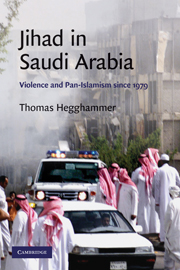Book contents
- Frontmatter
- Contents
- List of figures and tables
- Acknowledgements
- A note on conventions
- Introduction
- 1 The politics of pan-Islamism
- 2 The classical jihadists
- 3 Recruitment to the early jihad fronts
- 4 Opportunities for global jihad
- 5 Al-Qaida and Saudi Arabia
- 6 Recruitment to al-Qaida
- 7 Post-9/11 Saudi Arabia
- 8 The mujahidin on the Arabian Peninsula
- 9 Recruitment to the QAP
- 10 The failure of the jihad in Arabia
- Conclusion
- Appendix 1 – Socio-economic data on Saudi militants
- Appendix 2 – Chronology of Islamist violence in Saudi Arabia, 1979–2009
- Bibliography
- Index
- CAMBRIDGE MIDDLE EAST STUDIES 33
- References
1 - The politics of pan-Islamism
Published online by Cambridge University Press: 05 June 2012
- Frontmatter
- Contents
- List of figures and tables
- Acknowledgements
- A note on conventions
- Introduction
- 1 The politics of pan-Islamism
- 2 The classical jihadists
- 3 Recruitment to the early jihad fronts
- 4 Opportunities for global jihad
- 5 Al-Qaida and Saudi Arabia
- 6 Recruitment to al-Qaida
- 7 Post-9/11 Saudi Arabia
- 8 The mujahidin on the Arabian Peninsula
- 9 Recruitment to the QAP
- 10 The failure of the jihad in Arabia
- Conclusion
- Appendix 1 – Socio-economic data on Saudi militants
- Appendix 2 – Chronology of Islamist violence in Saudi Arabia, 1979–2009
- Bibliography
- Index
- CAMBRIDGE MIDDLE EAST STUDIES 33
- References
Summary
In the past few years, a number of sister Islamic nations … have experienced unusual crises and natural disasters … The government has consistently come to the rescue of these ravaged countries in order to strengthen the ties of fraternity among Islamic countries, inspired by the precepts of Islam that call for cooperation and solidarity among mankind.
Saudi Ministry of Finance, 1991From the mid-1980s to the mid-1990s, thousands of Saudis left quiet lives of material comfort to fight in Afghanistan, Tajikistan, Bosnia and Chechnya. They put their lives at risk for people they had never met and for territories they could barely place on a map. In a time of low oil prices, the Saudi state spent billions of dollars to liberate countries thousands of miles away. Its army was too weak to defend Saudi oilfields against Iraq in 1990, yet it encouraged its young men to take part in other Muslims' wars in Europe and Central Asia.
The driving force behind this curious behaviour was pan-Islamism, an ideology based on the view that all Muslims were one people who had a responsibility to help each other in times of crisis. In the 1980s the Muslim world witnessed the rise of an increasingly militarised interpretation of pan-Islamism, which saw the umma as threatened from the outside and placed a special emphasis on helping Muslims involved in conflicts against non-Muslims. The most extreme proponents of this ideology sought to convince average citizens to get militarily involved in other Muslims' struggles of national liberation.
- Type
- Chapter
- Information
- Jihad in Saudi ArabiaViolence and Pan-Islamism since 1979, pp. 16 - 37Publisher: Cambridge University PressPrint publication year: 2010

